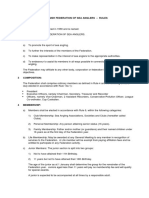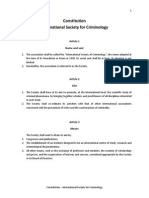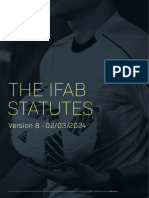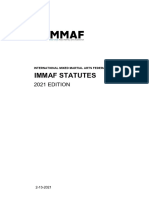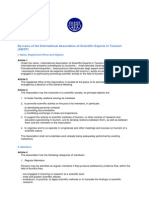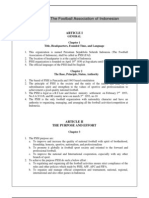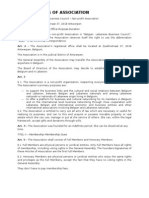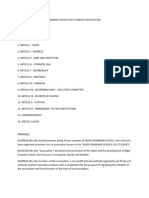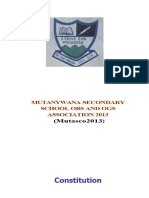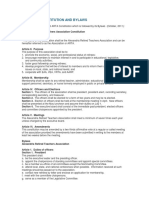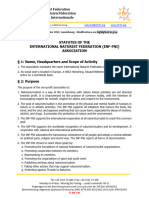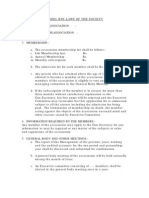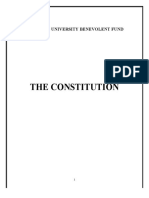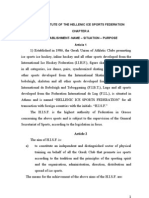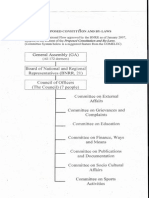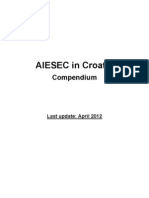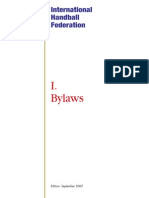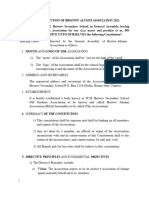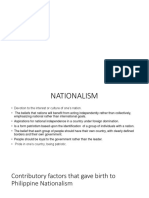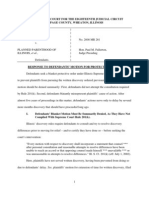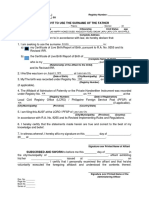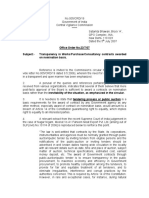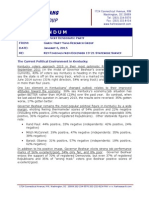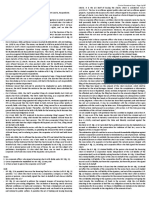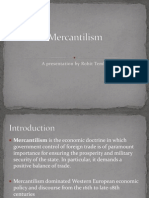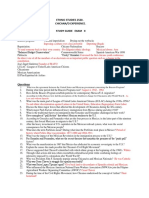0 ratings0% found this document useful (0 votes)
63 viewsConstitution of The Federation of European Shogi Associations
Constitution of The Federation of European Shogi Associations
Uploaded by
Miguel G. MachoThe Constitution establishes the Federation of European Shogi Associations (FESA) to promote and organize the traditional Japanese game of Shogi in Europe. FESA is registered as a nonprofit association under French law with its headquarters in Jebsheim, France.
FESA's objectives are to group national Shogi associations, promote Shogi activities, and support Shogi players and associations. It carries out activities like organizing tournaments, maintaining a player rating system, and seeking sponsors. National Shogi associations can apply for membership or observer status with FESA.
FESA is governed by a General Assembly and Executive Board. The General Assembly includes one representative from each member association and meets annually. It votes
Copyright:
© All Rights Reserved
Available Formats
Download as PDF, TXT or read online from Scribd
Constitution of The Federation of European Shogi Associations
Constitution of The Federation of European Shogi Associations
Uploaded by
Miguel G. Macho0 ratings0% found this document useful (0 votes)
63 views4 pagesThe Constitution establishes the Federation of European Shogi Associations (FESA) to promote and organize the traditional Japanese game of Shogi in Europe. FESA is registered as a nonprofit association under French law with its headquarters in Jebsheim, France.
FESA's objectives are to group national Shogi associations, promote Shogi activities, and support Shogi players and associations. It carries out activities like organizing tournaments, maintaining a player rating system, and seeking sponsors. National Shogi associations can apply for membership or observer status with FESA.
FESA is governed by a General Assembly and Executive Board. The General Assembly includes one representative from each member association and meets annually. It votes
Original Description:
Legislación referente a la federación europea de shogi
Original Title
FESA bylaws
Copyright
© © All Rights Reserved
Available Formats
PDF, TXT or read online from Scribd
Share this document
Did you find this document useful?
Is this content inappropriate?
The Constitution establishes the Federation of European Shogi Associations (FESA) to promote and organize the traditional Japanese game of Shogi in Europe. FESA is registered as a nonprofit association under French law with its headquarters in Jebsheim, France.
FESA's objectives are to group national Shogi associations, promote Shogi activities, and support Shogi players and associations. It carries out activities like organizing tournaments, maintaining a player rating system, and seeking sponsors. National Shogi associations can apply for membership or observer status with FESA.
FESA is governed by a General Assembly and Executive Board. The General Assembly includes one representative from each member association and meets annually. It votes
Copyright:
© All Rights Reserved
Available Formats
Download as PDF, TXT or read online from Scribd
Download as pdf or txt
0 ratings0% found this document useful (0 votes)
63 views4 pagesConstitution of The Federation of European Shogi Associations
Constitution of The Federation of European Shogi Associations
Uploaded by
Miguel G. MachoThe Constitution establishes the Federation of European Shogi Associations (FESA) to promote and organize the traditional Japanese game of Shogi in Europe. FESA is registered as a nonprofit association under French law with its headquarters in Jebsheim, France.
FESA's objectives are to group national Shogi associations, promote Shogi activities, and support Shogi players and associations. It carries out activities like organizing tournaments, maintaining a player rating system, and seeking sponsors. National Shogi associations can apply for membership or observer status with FESA.
FESA is governed by a General Assembly and Executive Board. The General Assembly includes one representative from each member association and meets annually. It votes
Copyright:
© All Rights Reserved
Available Formats
Download as PDF, TXT or read online from Scribd
Download as pdf or txt
You are on page 1of 4
Constitution of the Federation of European Shogi Associations
Article 1: Basic provisions
Name of the association: Federation of European Shogi Associations (hereinafter
FESA)
Seat of the association: 41b rue d’Ostheim 68320 Jebsheim
Article 2: Legal nature
FESA is a standalone, independent, open, and apolitical organization through which its
members execute their activities within its own Constitution. FESA is registered as an
association under French law according to articles 21 79 from local regulation, as
defined in the French civil legislation of 1st of June 1924.
Article 3: Objectives and activities
1. Objective of FESA is to group national associations and organizations promoting
and organizing the traditional Japanese game of Shogi(hereinafter Shogi). FESA’s
aim is to spread Shogi to more people, to promote Shogi activities and to support
existing Shogi players and national Shogi associations that are members of FESA.
2. To pursue abovementioned objectives FESA carries out a range of activities such
as:
a) assemble executives from member associations and players of Shogi in
Europe
b) cooperate and communicate with other Shogi associations
c) institute playing Shogi in Europe
d) create rules and conditions for organizing tournaments in Shogi
e) keep standardized rating system of Shogi players
f) manage organization of European Shogi Championship
g) manage organization of World Open Shogi Championship
h) strive to provide for sponsors and financial assets from both natural and
legal entities
i) carry out other activities to promote and spread Shogi and create viable
conditions for playing Shogi in Europe on an official level.
Article 4: Membership in FESA
1. Membership in FESA is voluntary and cannot be transfered to other legal or natural
entity
2. Only legally registered national Shogi associations, which are considered the
overall Shogi organizations of their countries, can become a member of FESA.
There can only be one member organization from any one country. These
associations have to agree with the constitution of FESA.
3. Applications to become a FESA member have to be submitted electronically to
official email address of FESA: secretary@fesashogi.eu. An application has to
contain the name of the organization, the country where the association is
registered and the names, addresses and email addresses of the official
representatives of the association.
4. Accepting applications to become a member of FESA is decided by vote of majority
of FESA members at the General Assembly.
5. Members of FESA are represented at FESA by representatives selected by their
internal national rules and laws.
6. National shogi associations which are not legally registered may obtain observer
status at FESA by majority vote of the General Assembly. Observing associations
may participate in the General Assembly meetings without voting right.
Article 5: Rights and duties of FESA members
1. All membership-related activities are carried out by members’ official
representatives at FESA.
2. Members of FESA have the right to:
a) vote for members of FESA organs
b) vote at the General Assembly
c) vote on any topic presented by executives of FESA
d) participate in activities carried out by FESA
e) post a candidature to organize European Shogi Championship and World
Open Shogi Championship
f) present their members as candidates for FESA organs
g) have their members rated and ranked by FESA rating system
h) submit new ideas and suggestions to executive organs of FESA
i) suggest changes of the Constitution
j) present complaints to FESA executive organs
3. Members of FESA are obliged to:
a) adhere to the constitution of FESA
b) pay their membership fee as decided by the General Assembly.
c) adhere to other documents authorized by executive organs of FESA
d) act in a way that does not harm the reputation of FESA
e) inform without delay about changes of their representatives by FESA
Article 6: Termination of membership
1. Members can terminate their membership by informing the Secretary of FESA
through their official representatives in writing. Any outstanding debt must be paid
in full before this can take effect.
2. Members can be expelled for strong violations of the constitution of FESA.
Termination of membership in this manner has to be supported by a two-thirds
majority of votes of FESA members at the General Assembly.
3. Membership in FESA is also terminated by termination of the membership
association. In such case, the respective member is obliged to inform the Secretary
of FESA about this fact.
Article 7: Organs of FESA
Organs of FESA are:
a) The General Assembly
b) The Executive board
c) The Auditor(s)
Article 8: General Assembly
1. The General Assembly is the highest executive organ of FESA.
2. The General Assembly is organized at least once a year at the time of the
European Shogi Championship. The General Assembly consists of 1
representative for each member association. The normal business of the
General Assembly meeting will be carried by simple majority of votes. 30% of
the registered members must be present at the meeting to constitute a quorum.
3. The General Assembly:
a) presents topics to be discussed and voted on by members
b) votes for members of FESA organs
c) approves the constitution and changes to the constitution
d) approves and changes subordinated rules related to its activities
e) approves the report about activities and accounting of FESA for past
periods
f) approves the report of the Auditor(s)
g) decides membership fee policy
h) can decide to terminate FESA in accordance with Article 13
i) can decide to expel a member of FESA
Article 9: Executive Board:
1. The Executive Board consists of Chairman, Secretary and Treasurer.
2. The Executive Board manages activities of FESA for the period of 2 years starting
after the day of their election.
3. The Executive Board prepares and submits a report of activities and accounting to
the General Assembly
Article 10: Chairman
The Chairman of FESA is the legal representative of FESA and acts in the name of
FESA.
Article 11: Secretary
The Secretary deals with all written business of FESA. He keeps record of members of
FESA and their representatives. The Secretary writes up the minutes of the General
Meeting and circulates them to all members within a reasonable period of time. All
substantive correspondence shall be in English.
Article 12: Treasurer
1. The Treasurer of FESA is responsible for accounting and keeping track of
possessions of FESA.
2. The Treasurer of FESA is responsible for collecting membership fees, accepting
donations and payments and also for paying either to FESA members or third
parties with the approval of the Chairman and/or the General Assembly
3. The Treasurer keeps all agreements and bills of FESA.
Article 13: Auditor(s)
1. The Auditor(s) is/are directly accountable to the General Assembly.
2. The Auditor(s) is/are responsible for checking on activities and accounting carried
out by the FESA Executive Board and for checking on carrying out decrees given
by the General Assembly.
3. Auditor(s) prepare and submit the report of the Auditor(s) to the General Assembly
4. The General Assembly can select one or two Auditors. The Auditor(s) cannot be
members of the Executive Board.
Article 14: Principles of management
1. FESA manages financial and non-financial assets
2. FESA is a non-profit organization
3. Source of income are:
a) membership fees
b) donations or grants from natural or legal entities
4. The Executive Board of FESA manages the association’s assets according to the
approved budget.
Article 15: Termination of FESA
FESA can be terminated by votes of ⅔ of all FESA members at a General Meeting
which is expressly called for this purpose.
Article 16: Final provisions
These by-laws can be changed only by decision of the General Assembly
FESA is an association registered in France, at Colmar, in the association registration
book nr 71, folio 1 since 5th of January 2016.
You might also like
- Mothers of A New World Maternalist Politics and The Origins of Welfare StateDocument229 pagesMothers of A New World Maternalist Politics and The Origins of Welfare StatewanNo ratings yet
- Cfsa Rule BookDocument11 pagesCfsa Rule Bookapi-385634149No ratings yet
- By - Laws of AssociationDocument6 pagesBy - Laws of AssociationAyne CabacunganNo ratings yet
- Dizon V Commanding GeneralDocument3 pagesDizon V Commanding GeneralKirby Hipolito100% (2)
- 2nd Quarter Exam Community Engagement Solidarity and Citizenship 12Document2 pages2nd Quarter Exam Community Engagement Solidarity and Citizenship 12Russiel Dagohoy100% (4)
- Ewa Statutes 2002-07-16 English OnlyDocument7 pagesEwa Statutes 2002-07-16 English OnlyAfrim TonuziNo ratings yet
- Constitution International Society For Criminology: Article 1 Name and SeatDocument6 pagesConstitution International Society For Criminology: Article 1 Name and SeatSyed AliNo ratings yet
- IFAB StatutesDocument12 pagesIFAB StatutesAliNo ratings yet
- IMMAF-Statutes-2021-Edition_FinalDocument21 pagesIMMAF-Statutes-2021-Edition_FinalDayan SamarasekaraNo ratings yet
- Estatuto de AEIST PDFDocument6 pagesEstatuto de AEIST PDFNelio Villafuerte MaruriNo ratings yet
- StatutesDocument15 pagesStatutesNovrizal SyahNo ratings yet
- BLBC Articles of Association: TITEL I - Name-Registered Office-Purpose-DurationDocument6 pagesBLBC Articles of Association: TITEL I - Name-Registered Office-Purpose-Durationdreamzsolution100% (3)
- International Biology Olympiad E.v.: Articles of AssociationDocument11 pagesInternational Biology Olympiad E.v.: Articles of AssociationNurzyah Riwana TNo ratings yet
- Draft Bye LawsDocument7 pagesDraft Bye LawsBalaji BiradarNo ratings yet
- 2017 AIC CONSTITUTION Revu2018Document5 pages2017 AIC CONSTITUTION Revu2018fdsxn dofdrsNo ratings yet
- EACMFSconstitutionLondon Sept 16Document9 pagesEACMFSconstitutionLondon Sept 16LiudmilaNo ratings yet
- Ghana Airport Company Limited Rescue and Firefighting Service (RFFS)Document7 pagesGhana Airport Company Limited Rescue and Firefighting Service (RFFS)frank brobbey0% (1)
- WRABF ConstitutionDocument14 pagesWRABF ConstitutionWRABF SecNo ratings yet
- The Constitution St. Augustine Nsambya Central Gakuweebwa Munno Tailoring Association Emyooga_041010Document10 pagesThe Constitution St. Augustine Nsambya Central Gakuweebwa Munno Tailoring Association Emyooga_041010Kutosi John NakhokhoNo ratings yet
- Constitution of Non-Governmental OrganizationDocument3 pagesConstitution of Non-Governmental OrganizationNonsoNo ratings yet
- Constitution of Niger Grammar School Old Students AssociationDocument9 pagesConstitution of Niger Grammar School Old Students Associationjapanobi1981No ratings yet
- Waga Constitution Amended May 2022Document3 pagesWaga Constitution Amended May 2022api-512392808No ratings yet
- Internal Rules 2019 English VersionDocument10 pagesInternal Rules 2019 English VersionJG DEVETINo ratings yet
- Tuliza ConstitutionDocument4 pagesTuliza ConstitutionemunenenNo ratings yet
- Society Constitution of The Parliament of OceanaDocument11 pagesSociety Constitution of The Parliament of OceanaParliament of OceanaNo ratings yet
- Memorandum of Association of Alumni AssociationDocument17 pagesMemorandum of Association of Alumni Associationuday chavanNo ratings yet
- ETN AoADocument9 pagesETN AoAsdiamanNo ratings yet
- A & A TREASURE THREADS Constitution.Document9 pagesA & A TREASURE THREADS Constitution.Ambrose Eolu100% (2)
- Statutes EngDocument2 pagesStatutes EngGuilherme CorreaNo ratings yet
- Iccsc Bylaws & ConstitutionDocument12 pagesIccsc Bylaws & Constitutionmhardy1906No ratings yet
- सविधान सिक्किम प्रोग्रेसिभ युथ फोरमDocument6 pagesसविधान सिक्किम प्रोग्रेसिभ युथ फोरमenochgajmer20No ratings yet
- Mutasco 2013 ConstitutionDocument14 pagesMutasco 2013 ConstitutionMukiibi DuncanNo ratings yet
- The Arta Constitution and BylawsDocument4 pagesThe Arta Constitution and BylawsRohj EbreoNo ratings yet
- ISHR Statutes Satzung EnglishDocument11 pagesISHR Statutes Satzung EnglishEsther SemakulaNo ratings yet
- UGCDAA ConstitutionDocument9 pagesUGCDAA ConstitutionK-touch CharlieNo ratings yet
- Statutes INF FNI 2022 ENDocument9 pagesStatutes INF FNI 2022 ENdavid pradaNo ratings yet
- Fovp ConstitutionDocument7 pagesFovp Constitutionapi-349822113No ratings yet
- Constitution 1617Document19 pagesConstitution 1617Marco ChanNo ratings yet
- Model Bye-Laws of The SocietyDocument7 pagesModel Bye-Laws of The SocietymaildesaleNo ratings yet
- Benevolent Fund ConstitutionDocument14 pagesBenevolent Fund ConstitutionElvin AmuguNo ratings yet
- 0 01 - Statutes GBDocument35 pages0 01 - Statutes GBPok DengNo ratings yet
- The Old Aguata Union Constitution AmendmentDocument37 pagesThe Old Aguata Union Constitution AmendmentIgwebuike UzochukwuNo ratings yet
- PACA Constitution 27 Sept 2007Document8 pagesPACA Constitution 27 Sept 2007pitshangerNo ratings yet
- The Statute of The Hellenic Ice Sports Federation Chapter A Establishment-Name - Situation - Purpose Article 1Document33 pagesThe Statute of The Hellenic Ice Sports Federation Chapter A Establishment-Name - Situation - Purpose Article 1Diafthora PagodromiesNo ratings yet
- Rules & Regulations of RWA D Block D-61-135 AP 7 - 2 - PDFDocument5 pagesRules & Regulations of RWA D Block D-61-135 AP 7 - 2 - PDFnishkamgNo ratings yet
- Devine Attheletic ClubDocument12 pagesDevine Attheletic ClubBESIGYE JONANNo ratings yet
- Proposed Constitution 2007 Up-IcDocument12 pagesProposed Constitution 2007 Up-IcGeorge Pm BarriosNo ratings yet
- Constitution of Iwlf Amended Upto 21.12.2013Document34 pagesConstitution of Iwlf Amended Upto 21.12.2013swarnimNo ratings yet
- ICRF Constitution 2023 WP 28082023Document23 pagesICRF Constitution 2023 WP 28082023JosefNo ratings yet
- AIESEC in Croatia Compendium - April 2012Document52 pagesAIESEC in Croatia Compendium - April 2012bubica_zubicaNo ratings yet
- 0 Ihf Statuts Chap 01 GBDocument36 pages0 Ihf Statuts Chap 01 GBNithya SekarNo ratings yet
- Ccrhpwa Bye-LowDocument11 pagesCcrhpwa Bye-Lowapi-294979872No ratings yet
- Rules of The General Assembly of The Philippine Medical AssociationDocument11 pagesRules of The General Assembly of The Philippine Medical AssociationGian Alexis FernandezNo ratings yet
- Alumni ConstitutionDocument10 pagesAlumni ConstitutionZakariaNo ratings yet
- Constitution of Aiacegeo (Pre Convention)Document6 pagesConstitution of Aiacegeo (Pre Convention)Vigneshwar Raju PrathikantamNo ratings yet
- STATUTE ENDocument5 pagesSTATUTE ENhannaprybyshchukNo ratings yet
- 2022 BAA Constitution AmendedDocument25 pages2022 BAA Constitution AmendedTerna HonNo ratings yet
- Asuuconstitution PDFDocument27 pagesAsuuconstitution PDFDickson MusaNo ratings yet
- The Constitution of Management Students' AssociationDocument15 pagesThe Constitution of Management Students' AssociationAnonymous 0Q7I8mQLcNo ratings yet
- Sara Federation of Tricycle Owners and Drivers AssociationDocument5 pagesSara Federation of Tricycle Owners and Drivers AssociationPass WordNo ratings yet
- Council of Europe Convention on the manipulation of sports competitions: And explanatory reportFrom EverandCouncil of Europe Convention on the manipulation of sports competitions: And explanatory reportNo ratings yet
- NSTP 1Document17 pagesNSTP 1Catherine Mendez PecatoNo ratings yet
- 2018 Spring Morehead Evidence Exam AnswerDocument25 pages2018 Spring Morehead Evidence Exam Answersteph.hernan6704No ratings yet
- Conference 2021Document292 pagesConference 2021DWI APRILIANINo ratings yet
- MergedPDFDocument 133752836307662979Document10 pagesMergedPDFDocument 133752836307662979F SedighiNo ratings yet
- Response To Defendants' Motion For Protective OrderDocument12 pagesResponse To Defendants' Motion For Protective OrderTom Ciesielka100% (1)
- LAW 101-Introduction To Legal Reasoning-Abid Hussain Imam PDFDocument5 pagesLAW 101-Introduction To Legal Reasoning-Abid Hussain Imam PDFAmna EhsanNo ratings yet
- Buatis, Jr. vs. People G.R. No. 142509Document15 pagesBuatis, Jr. vs. People G.R. No. 142509Claudia Rina LapazNo ratings yet
- Affidavit To Use The Surname of The FatherDocument1 pageAffidavit To Use The Surname of The FatherMario Rizon Jr.No ratings yet
- The Origins of The Administrative Elite - Peter GowanDocument31 pagesThe Origins of The Administrative Elite - Peter GowanpeterVoterNo ratings yet
- Enhancing Market-Oriented Urban Agriculture in The Gaza Strip: Networking For Policy Change and ResilienceDocument9 pagesEnhancing Market-Oriented Urban Agriculture in The Gaza Strip: Networking For Policy Change and ResilienceOxfamNo ratings yet
- The People of The Philippines v. Renante Mendez and Baby Cabagtong (G.r. No. 147671. November 21, 2002)Document5 pagesThe People of The Philippines v. Renante Mendez and Baby Cabagtong (G.r. No. 147671. November 21, 2002)Ei BinNo ratings yet
- Ramos Peace and Development FoundationDocument12 pagesRamos Peace and Development FoundationclarheenaNo ratings yet
- Rights and Privileges of A TeacherDocument67 pagesRights and Privileges of A TeacherMarx Lewis Barquilla100% (1)
- Finance (Pay Cell) Department G.O.Ms - No.337, Dated 14 November 2017Document3 pagesFinance (Pay Cell) Department G.O.Ms - No.337, Dated 14 November 2017vanjinathan_a0% (1)
- Crime and Law AssignmentDocument4 pagesCrime and Law AssignmentSyed ZaryabNo ratings yet
- Corazon CDocument15 pagesCorazon CThea GonzalesNo ratings yet
- Caste Research PaperDocument58 pagesCaste Research PaperGagandeep SinghNo ratings yet
- OfficeOrderNo23 7 07Document2 pagesOfficeOrderNo23 7 07Hirak MukherjeeNo ratings yet
- NuisanceDocument205 pagesNuisanceChristine Jane RodriguezNo ratings yet
- KY-Gov Garin-Hart-Yang For Kentucky Democratic Party (Dec. 2014)Document2 pagesKY-Gov Garin-Hart-Yang For Kentucky Democratic Party (Dec. 2014)Daily Kos ElectionsNo ratings yet
- Enlightened Despotism: Maria Theresa (1740-1780)Document2 pagesEnlightened Despotism: Maria Theresa (1740-1780)MihálySzücsNo ratings yet
- Test 6Document13 pagesTest 6Wissam M PeterNo ratings yet
- CrimPro CasesDocument67 pagesCrimPro CasesMaria Angelica DavidNo ratings yet
- 19970124b Trial Transcript Regarding TapesDocument20 pages19970124b Trial Transcript Regarding TapesSamples Ames PLLCNo ratings yet
- MercantilismDocument18 pagesMercantilismRohit Tembe100% (1)
- Introduction To LawDocument8 pagesIntroduction To Law22le2-035No ratings yet
- Study Guide Exam 2 Chicano StudiesDocument2 pagesStudy Guide Exam 2 Chicano StudiesLogan BinghamNo ratings yet

